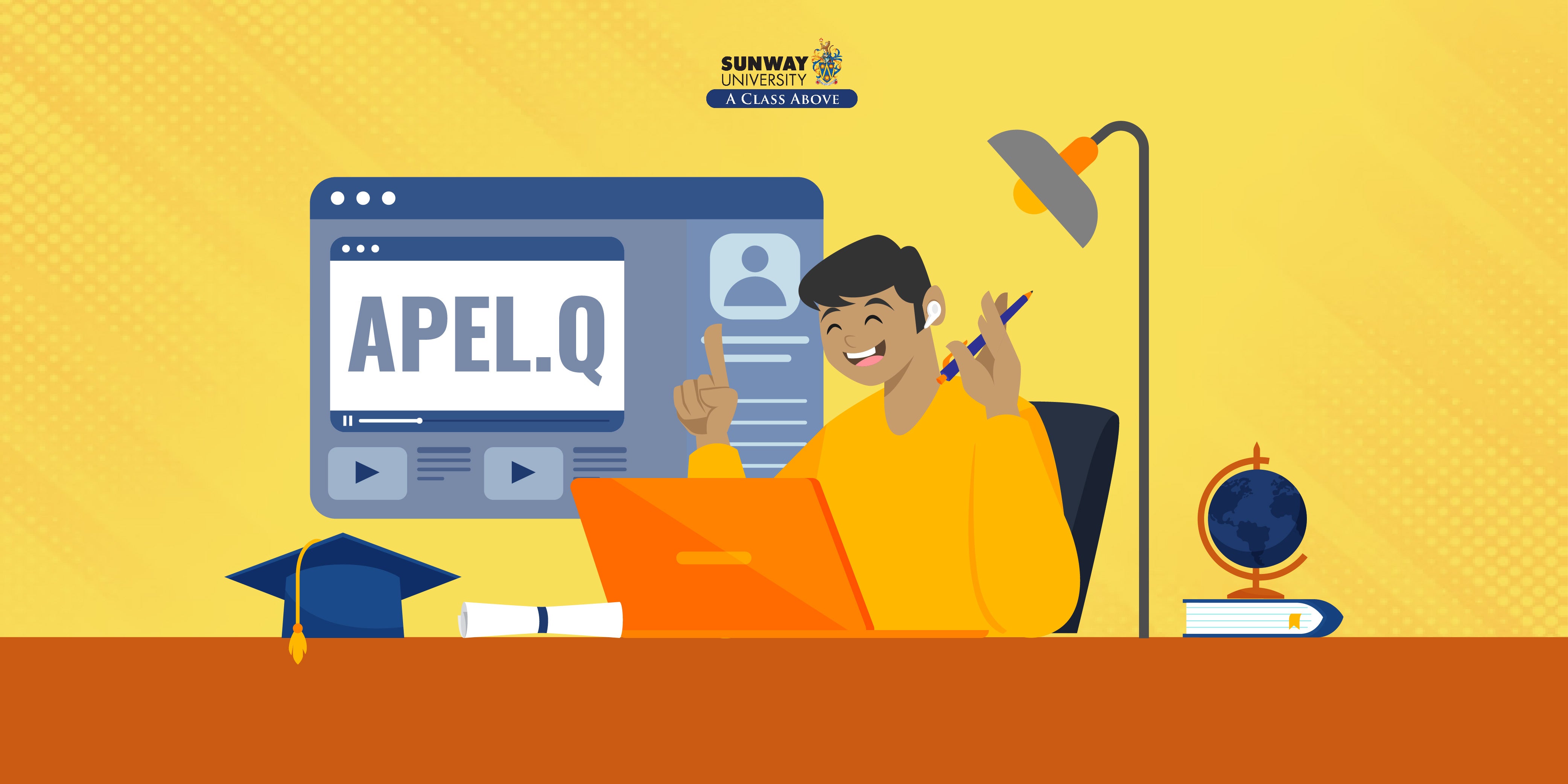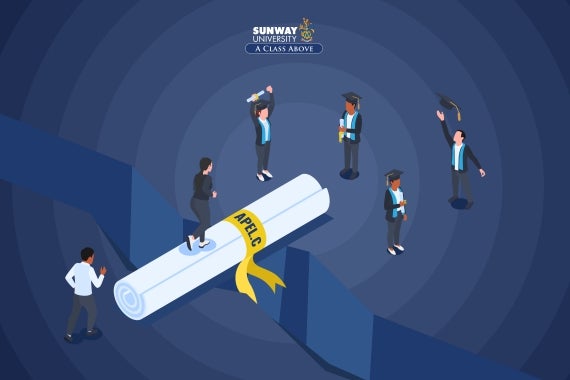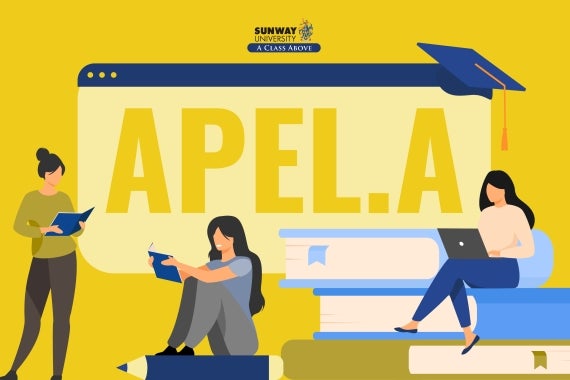APEL.Q: Transform Your Work Experience Into a Degree

The value of experience cannot be understated, but many skilled professionals find themselves at a career standstill due to their lack of formal academic qualifications. There are numerous reasons why one might have missed the opportunity to obtain these certificates or degrees – but here’s where APEL.Q can help.
This transformative approach to education recognises the value of experiential learning, granting graduating credits that lead up to the award of an academic qualification to individual learners. For professionals without formal qualifications who are keen to advance their career and achieve their education goals, this is your guide to APEL.Q.
What is APEL.Q?
APEL.Q stands for Accreditation of Prior Experiential Learning for Qualification. It is a pathway that allows you to leverage your existing knowledge and skills, gained through work experience, short courses, and other modes of informal or non-formal learning, to earn a fully accredited qualification. Essentially, APEL.Q transforms your experiential learning into graduating credits for a programme of study via a series of assessments and the completion of a Capstone Course.
This pathway was introduced by the Malaysian Qualifications Agency (MQA) under the APEL umbrella that promotes lifelong learning and provides opportunities to individuals of various backgrounds and ages to access tertiary-level education.
Through APEL.Q, applicants will have their formal, informal, and non-formal learning assessed based on their accumulated experience, knowledge and skills. Success in APEL.Q hinges on applicants’ ability to demonstrate that their experiential learning sufficiently meets their programme of study’s learning outcomes.
Benefits of APEL.Q
There are numerous benefits to pursuing an academic qualification through APEL.Q, including:
✓ Reduced Cost and Time for Study
By demonstrating that their experiential learning and accumulated experience meet programme learning outcomes, applicants are able to earn graduating credits without having to take individual courses the traditional way. This means a shorter overall study duration and cost savings.
✓ Formal Recognition of Skills
APEL.Q validates your work experience, short courses taken, and other informal means of skills and knowledge acquisition, as part of its process to help you earn an officially recognised academic qualification.
✓ Avoid Redundant Learning
By having your prior learning recognised, you do not have to take courses covering areas and subjects that you have already mastered.
✓ Increased Access to Education
APEL.Q gives adult learners the opportunity to enrol in and graduate from fully accredited programmes of study, when they would otherwise find it difficult to access tertiary-level education due to their lack of qualifying certificates or degrees.
✓ Career and Salary Boost
By attaining academic qualifications via APEL.Q, successful applicants can enhance their career prospects and earning potential in a highly competitive job market, where employers take note not only of years of work experience, but also academic credentials.
Who Should Apply for APEL.Q?
APEL.Q is ideal for individuals with:
- Relevant and extensive work experience
- A strong desire to formalise their knowledge and skills
- No prior formal qualifications, or possessing qualifications not aligned with their career goals
To apply for APEL.Q, applicants must fulfil the minimum years of relevant working experience required, depending on the desired level of study.

APEL.Q vs APEL.A vs APEL.C vs APEL.M: What’s the Difference?
Other than APEL.Q, MQA also offers the following APEL types:
- Accreditation of Prior Experiential Learning for Access (APEL.A)
- Accreditation of Prior Experiential Learning for Credit Award (APEL.C)
- Accreditation of Prior Experiential Learning for Accumulation of Micro-credentials (APEL.M)
APEL.Q allows you to get an academic qualification using your extensive experience. Your experiential learning can be transformed into credits for an entire study programme via a series of assessment tasks, and you will only need to complete a capstone course from the programme curriculum.
APEL.A, meanwhile, provides those with work experience the opportunity to attain admission or access to a programme of study. Through an assessment of your formal education, as well as your past work and learning experiences, you can access 6 levels of qualifications, namely:
- Certificate
- Diploma
- Advanced Diploma
- Bachelor’s Degree
- Master’s Degree
- Doctoral Degree
There is also APEL.C, which recognises and awards you with credits for learning you have done by assessing your prior experience. You can earn up to 30% of your graduating credits for all levels of education if your work or learning experiences match the learning outcomes of your selected course. This could help you complete a programme of study faster.
Finally, APEL.M enables candidates who lack formal academic qualifications to enter a tertiary-level programme, but have attained the equivalent of at least 50% of graduating credits via unbundled micro-credentials, to gain admission into the programme. Upon admission, they need only complete the remaining credits not obtained via micro-credentials.

How to Apply for APEL.Q
The application process for APEL.Q may differ slightly depending on the Higher Education Provider (HEP) offering the pathway. However, the general steps to apply for APEL.Q are as follows:
1. Research: Identify a programme you're interested in and ensure the HEP offers the APEL.Q pathway for that programme.
2. Contact the institution: Get in touch with the APEL.Q assessment centre at the HEP to discuss your eligibility and receive application guidance.
3. Complete self-assessment: You will complete a self-assessment form, after which an advisor will determine your eligibility for APEL.Q. If you are deemed eligible, you can proceed with submitting the APEL.Q application form and fees payment.
4. Prepare portfolio: Compile evidence of your work and other learning experiences, including job descriptions, relevant certificates, and testimonials. Showcase accomplishments that are aligned with the learning outcomes of your study programme of choice.
5. Assessment: The APEL.Q assessment consists of 3 major instruments, namely:
i) Portfolio Submission
ii) Field Visit and Validation (FVV)
iii) Challenge Test
These must be passed in sequential order before applicants move on to the next stage of assessment: the Capstone Course.
The Capstone Course amalgamates the key learning outcomes of the study programme, and is where applicants demonstrate their mastery of programme learning outcomes. An oral examination is built into the evaluation.
For postgraduate-level study, the award of academic qualifications is confined to coursework and mixed-mode programmes. For a coursework programme, the applicant has to complete the stipulated Capstone Course, while for a mixed-mode programme, a research component (thesis or dissertation) is deemed as the Capstone Course.

6. Approval and Award of Credit: Upon successfully passing all levels of assessment, you will be notified about the award of graduating credits and academic qualification via the APEL.Q pathway.
APEL.Q Frequently Asked Questions (FAQs)
1. Is there an age limit for applying for APEL.Q?
No. APEL.Q does not have a specified age limit. However, APEL.Q does set a minimum number of years of work experience required for each level of study. Applicants who do not meet the stated minimum years of work experience, but have relevant learning experience, can be considered on a case-by-case basis by the highest academic body (e.g. the Senate) of the HEP.
2. What types of programmes can I pursue through APEL.Q?
APEL.Q is applicable to a wide range of programmes offered by HEPs that have received MQA approval to offer the pathway. Check with your HEP of choice to confirm their status and programmes offered.
APEL.Q can lead to the award of graduating credits and formal qualification for these levels of study:
- Certificate
- Diploma
- Advanced Diploma
- Bachelor’s Degree
- Master’s Degree
- Doctoral Degree
3. Is APEL.Q limited to Malaysian citizens only?
No. APEL.Q applications are open to both Malaysian and international candidates.
4. What are the assessment instruments for APEL.Q?
APEL.Q candidates are assessed using the following instruments, in sequence:
- Portfolio Assessment
- Field Visit and Validation (FVV)
- Challenge Test
- Capstone Course
5. What is a Portfolio Assessment?
A portfolio is a formal document containing a compilation of evidence of a candidate’s learning experiences, including work experience, acquired over a certain period. This learning can be formal, non-formal, or informal. The portfolio is then assessed for alignment with the knowledge and skills required to meet the learning outcomes of the chosen programme of study.
6. What is assessed during the Field Visit and Validation (FVV)?
The FVV determines whether an APEL.Q candidate’s knowledge and skills meet the requirements to be turned into graduating credits.
The FVV component is usually conducted at the candidate’s workplace or in a conducive environment/location that allows for a precise and accurate assessment. The assessment can be carried out at the workplace, in a lab, or in a simulated condition.
This assessment allows the candidate to demonstrate that their learning in a specific job matches the learning outcomes of the programme.
7. What is the Challenge Test?
The Challenge Test is a standard proctored test that assesses whether the candidate has attained the knowledge and skills level required of the programme. The Challenge Test can be a written test, oral examination, product assessment, and/or performance assessment, depending on the nature and discipline of the programme.
8. What is a Capstone Course?
The Capstone Course merges the main learning outcomes of the programme and demonstrates that the applicant has mastered the core discipline of their studies. Generally, Capstone Courses are offered in the final semester/year of studies.
A comprehensive oral assessment will be built into the Capstone Course evaluation. This oral assessment aims to:
- Test the applicant’s overall understanding of the core discipline/field of study; and,
- Prove that the applicant’s overall learning experience is of a sufficiently high standard to merit the awarding of an academic qualification.
9. What will be evaluated in the various assessment instruments in APEL.Q?
The achievement of learning outcomes for the specific programme applied for by the APEL.Q applicant.
10. Once an assessment decision is issued to a candidate, can I make an appeal? Will the appeal process include a review of the assessment decision?
Yes. you can appeal the assessment decision. The appeal process involves only a review of the APEL.Q decision, and does not include the submission of additional evidence or retaking/resitting of assessments.
If your appeal is rejected, you can retake/re-sit the assessments.
11. How many times is a student allowed to re-sit an assessment?
Students are given up to 3 attempts to redeem a failed status in any mode of assessment (Portfolio, FVV, Challenge Test, and Capstone Course).
12. What are the criteria for awarding APEL.Q?
To be awarded an academic qualification through APEL.Q, a candidate must:
- Pass each assessment instrument – Portfolio, FVV, Challenge Test, and Capstone Course – by achieving at least 50% of the score on each programme learning outcome tested for. If they fail to achieve a 50% score in any of the learning outcomes evaluated under the various assessment instruments, the candidate is considered to have not passed the assessment.
- Achieve a minimum CGPA of 2.0 out of 4.0 for pre-university and undergraduate programmes (Certificate, Diploma, Advanced Diploma, and Bachelor’s Degree), and 3.0 out of 4.0 for postgraduate programmes (Master’s Degree and Doctorate through coursework mode) and pass the research component (Master’s and Doctorate through Mixed Mode).
13. What are the APEL.Q fees?
Fees vary depending on the HEP and programme you choose. Contact the institution directly for the latest fees and related information.
Download the Guidelines to Good Practices for APEL.Q here.






